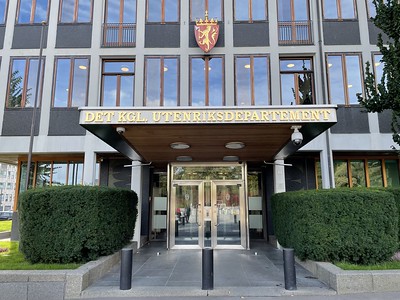After numerous reports and concerns that Russia may try to renegotiate or scrap its border agreement with Norway in the Barents Sea, Norway’s foreign ministry now flatly denies the Russians want to reconsider the pact. The Norwegians are also downplaying comments made to that effect by the president of Russia’s national assembly, the Duma.

Comments and criticism of the border deal agreed in 2010 “don’t represent the official Russian position,” Eivind Vad Petersson, a state secretary in the foreign ministry, told news bureau NTB just before the weekend. “That’s been confirmed by (Russian President Vladimir) Putin’s spokesman Dmitry Peskov.”
Petersson said it would also be “unnatural” for Norway to enter into any discussions with Russia based on statements by a single politician.” He was referring to comments made by Duma President Vjatsjeslav Volodin, who said the assembly should evaluate scrapping the border agreement known as the delelinjen. It literally resulted in agreed-upon lines extending from Russia’s and Norway’s mainland up through the Barents Sea, and literally setting a new border at sea.
It’s been important in terms of where each country’s rights apply, for everything from fishing to oil and gas exploration. Norwegian officials insist the agreement is not in play, nor does it contain any clauses that it can be terminated.
“The agreement exists in perpetuity,” Petersson told NTB. “We expect Russia to continue to respect the agreement. That’s in both Russia’s and Norway’s interests.”
Concerns for the future of the Barents border agreement had grown so high last week that the conservative Norwegian Progress Party thought the government should inform Norway’s own parliament (Stortinget) of the agreement’s status. “Now there’s lots of speculation that I and others can set off, without there being any grounds for it,” the party’s foreign policy spokesman, Christian Tybring-Gjedde, told newspaper Klassekampen on Friday. He thought the government should share its thoughts to calm concerns.
Others have also been concerned. Hårek Elvenes, foreign policy spokesman for the Conservatives, said he was worried too. “We can’t ignore it,” Elvenes told Klassekampen, referring to Volodin’s outburst on the Barents border. “Russia has shown an increasing willingness to put power behind its threats, and we have to recognize that.”
Russian media, no longer allowed to express any opposition to Russia’s official policy, went so far as to claim that Norway quickly allowed transport of Russian goods to its enclave in Svalbard last week after hearing about the alleged conflict over the Barents border. Not true, claim the Norwegians, noting that negotiations were already underway to allow the transport without violating sanctions against Russia.
‘Propaganda’
Jakub Godzimirski, a researcher at the Norwegian foreign policy institute NUPI, thinks it’s all part of Russian propaganda. That includes a Russian report that documents cases of alleged discrimination of Russians living abroad, also in Norway. Godzimirski, who follows Russia closely, calls the report a part of Russia’s communications strategy in connection with its war on Ukraine. He also notes that part of the Russian foreign ministry’s job is to protect its citizens abroad.
“But this of course must be seen in a broader context, with today’s situation as the backdrop,” Godzimirski told newspaper Dagsavisen. “It’s interesting that Russia takes time and energy to chart such an overview (of alleged discrimination of Russians in various countries including Norway), but it must be seen in connection with Russian propaganda.”
Among incidents charted in Norway was one in which a lodging accommodation in Sogndal refused to serve Russian citizens and one in which a Russian-born woman was turned away at a physiotherapy clinic in Moss. Norwegian authorities, meanwhile, have earlier advocated against any such discrimination and stressed that it was Putin and his regime that are causing problems, not ordinary Russians.
newsinenglish.no/Nina Berglund

